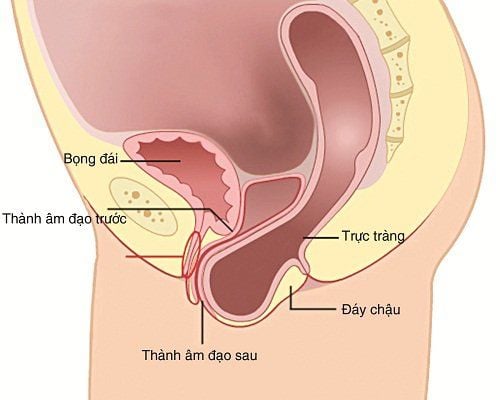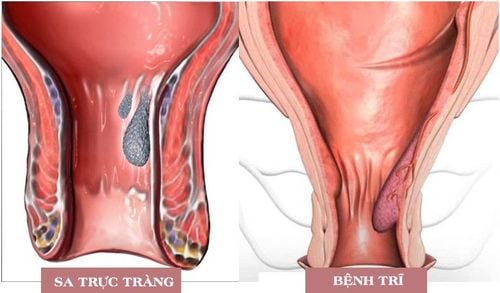This is an automatically translated article.
The article was professionally consulted by MSc Vu Van Quan - Department of General Surgery & Anesthesia, Vinmec Hai Phong International General Hospital. The doctor has more than 10 years of experience working in the field of General Gastroenterology.Rectal prolapse is common in middle-aged women, due to the effects of childbirth or aging. There are many treatments for rectal prolapse depending on the cause. Treatment of pouch-type rectal prolapse with a retrovaginal graft is one of the active treatments.
1. Pouch-type rectal prolapse
Rectal prolapse is a decrease in the elasticity of the muscular membrane that separates the rectum from the vagina, forming a bulge toward the vagina. Most middle-aged women suffer from the disease due to the effects of childbirth and aging, especially those who have experienced many births.1.1 Causes of rectal prolapse The cause of rectal prolapse is a weakening of the pelvic floor. As a result of episiotomy during childbirth, pelvic structures are weakened, or due to advanced age.
During childbirth, when the baby's head passes through the vagina, soft tissues such as ligaments and supporting fascia located in the septum between the rectum and the vagina are damaged, stretch and bulge towards the vagina. religion. The same phenomenon occurs with births where the fetus is too large. In addition, rectal prolapse due to prolonged constipation, hard labor, or chronic cough can also be the cause of weakened pelvic floor.

Genetics : Some people are born with weaker connective tissues in the pelvic area, which puts them at greater risk of developing rectal prolapse. postpartum bag. Aging: As we age, all organs in the body age. The muscles in the rectal wall are also weakened and dilated. Obesity: The increased body weight in obese people puts a great deal of pressure on the pelvic floor tissues. As a result, people with obesity have a higher risk of developing the disease. 1.2 Signs of pouch-type rectal prolapse When in early development, the prolapsed rectum is small in size and may not cause specific symptoms. More advanced disease often causes the following signs:
There is a soft mass in the vagina Always feeling fullness in the rectum Constipation, difficulty having a bowel movement. The patient has to push hard and use his hand to press on the vagina to make it easier to have a bowel movement There is a feeling that there is still stool in the rectum after a bowel movement Pain and discomfort during sex In severe cases can cause vaginal bleeding vagina, persistent fecal incontinence, or even the rectum protruding from the vaginal opening

2. Treatment of pouch-type rectal prolapse with retrovaginal grafts
There are many surgical approaches to the treatment of pouch-type rectal prolapse. If medical treatment does not work, the doctor will perform surgery. For the purpose of repairing lesions in the vagina and strengthening the septum of the rectum, remove the long rectum or insert a graft posterior to the vagina. The doctor can perform surgery through the anus, through the perineum, or through the vagina.Surgical treatment of rectal prolapse with posterior vaginal grafts with a cure rate of about 93-100%
After rectal prolapse surgery, patients are at risk of some complications such as: bleeding and infection at the surgical site, prolonged pain, vaginal adhesions, rectal narrowing... To limit the above complications and improve recovery, the patient should have plenty of rest, wash the wound and Change your bandages daily, exercise and eat according to your doctor's instructions.
In summary, rectal prolapse is a common disease in women because it is affected by childbirth and aging. Treatment of pouch-type rectal prolapse with a retrovaginal graft is a surgical treatment with a fairly high success rate. Therefore, when the patient has symptoms such as soft mass in the vagina, constipation, difficulty in defecation, feeling that there is still stool, etc., it is necessary to immediately go to a medical facility for timely examination and treatment. .
Please dial HOTLINE for more information or register for an appointment HERE. Download MyVinmec app to make appointments faster and to manage your bookings easily.














